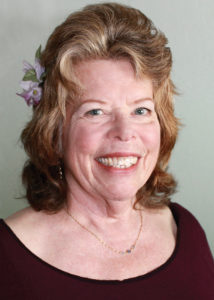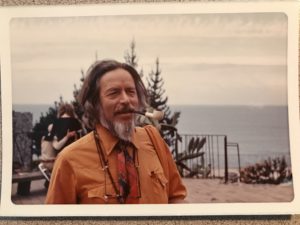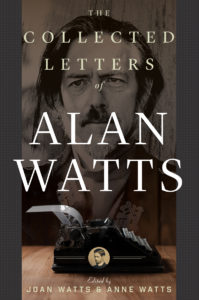Interview By Janae Jean & Spencer Schluter –
For this interview, we had the pleasure of speaking with Anne Watts, daughter of Alan Watts about her father’s work and The Collected Letters of Alan Watts. Alan Watts (1915–1973) was a renowned philosopher, Zen scholar, Episcopalian Priest, author and lecturer. The Collected Letters spans decades and includes Alan’s personal correspondence with family, friends and scholars including, Carl Jung, Aldous Huxley, Timothy Leary and Joseph Campbell. Anne and her sister Joan carefully selected the letters, edited the volume and added behind-the-scenes commentary.
Anne is a certified hypnotherapist and an educator and counselor in the areas of human sexuality, sexual abuse, family stress, healing the inner child, as well as financial and aging issues. She has facilitated workshops around the world with the Human Awareness Institute. Since 2008, she has been a faculty member of the Esalen Institute. In our conversation with Anne, we spoke with her about the importance of the field of philosophy, the relevance of her father’s work, the different ways people learn, and more.
You can find Anne online at www.annewatts.com. The official page for her father’s work is www.alanwatts.com.
The transcription below only contains a snippet of the conversation, to scroll to the bottom of the page to hear the entire podcast. Subscribe and listen on your favorite podcast format. We are available on iTunes, Stitcher, GooglePlay and YouTube.

Spencer: Philosophical work has become really relevant in today’s world. How does it feel that there’s a renewed interested in your father’s work, Zen Buddhism and philosophy?
Anne: To be honest, I’m very excited about it! I think it’s a wonderful thing. One of the things that we got really clear about as we were working on these letters … Alan’s letters are so relevant to today. There are many Facebook sites that are fan-sites for Alan, and these are international. Joan and I have been hearing from people from different countries, who are in their teens, who are discovering Alan Watts and feeling like his writing is making a real difference in their thinking and in their life experience. That always feels amazing to me. I’m thrilled that that’s so. I think that this book is giving people, who are not familiar with Alan’s work, the opportunity to become familiar with it. For those who have been fans for a long time, they’ll get to see the development of his thinking, his philosophies and the shifts that he moves through over time. I think that’s a really powerful thing. I think Alan was really encouraging people to communicate, to connect, and to lighten up and enjoy life.
Janae: I was reading the book, and I thought it was interesting that you could just see how he communicated … even with his parents. I also thought it was interesting to see the time period, just how different their worldview is, and how the influence of people like him has changed how we see the world.
SS: Like the way we see things now is because of the influences that came in during that time.
JJ: Yes, you see how these ideas come from a person, and they spread.
AW: The thing about Alan was that he was engaging and people loved to listen to him. Of course, nowadays, there’s all this stuff on YouTube and places like that. My brother, Mark, handles all of his videos, audio recordings and stuff like that. So, it’s very accessible to hear the spoken word. Also, for people who don’t have time to read, they have that connection. I think Alan really did a great job of popularizing Asian thought and awareness for the Western mind.
It’s so funny; on the back of the book, Stanley Krippner, wrote a review of the book, and he says, “Alan Watts once told me in fifty years nobody will remember me. To the contrary, his books, essays and recorded lectures have gained in stature in recent decades.” So, [laughs] I just love that Alan had no concept of his impact, really, on the world. That’s really pretty amazing.

SS: It’s like we’re starting to get back to what was being worked on back in the ‘50s and the ‘60s. Now there’s a resurgence of that. Why does this sort of thought have to have a resurgence? Why did we lose touch with it for so long?
AW: One aspect of it is the pendulum of life. Right? Things swing in one direction, and then they swing in another direction. We’re seeing that politically. If you go back in history, you see that we’re repeating the same patterns over and over. Again, it’s that pendulum swinging from one to another, so that was a part of it.
My father worked with Timothy Leary and Richard Alpert, who then became Ram Dass, and did studies with them with LSD and mescaline. They were at Harvard University at the time. He was fascinated with how something like that would affect the brain. He would take LSD or mescaline, and he would his record experience on a tape recorder. He would send it to them so that they could really follow what his experience was. For him, it was a religious thing; it was sacred. I think a lot of people got a hold of drugs and just got into the high of it. So, people were just getting high willy-nilly, and that was alarming to Alan. One of the letters he wrote, it was against making LSD, marijuana, mescaline, and drugs like that illegal because he said, “If you do that, it’s gonna be a mess because it will go underground, and there will be no way to evaluate the quality of the drugs people are taking, and they’ll get mixed with other things… and it’ll be dangerous. It’s not a good idea.” Sure enough, that’s exactly what happened because they weren’t going to listen to Alan Watts. [Laughs.] That’s a cautionary tale. The other thing is that he treated the mind-altering drugs that he was experimenting with, he treated it with respect, and I think what happened is people stopped doing that. Then they got themselves into trouble.
JJ: What brought you and your sister the idea to compile this book now? Was there something that spurred you on to do so?
AW: In 1993, our stepmother, Jano, died. She had all of Alan’s papers in boxes. Joan and I are the two eldest children of Alan, out of seven, and we’re the holders of the literary works basically. So, we got all the papers, all the letters, all the tax info, and the this and the that. My sister went through all that. She discovered all these letters. Alan kept carbon copies of all the letters he wrote. Joan had them in a couple of filing cabinets in her office for twenty-some years. We were at New World Library talking to the chief editor, Jason Gardner. (They were republishing books of Alan’s that had gone out of print.) Joan mentioned that she had these letters, and he just lit up. We decided we were going to edit those letters ourselves, and that’s how it all happened.
Janae Jean serves as editor, social media manager and podcaster for Conscious Community Magazine. She has an M.M. in Computer Music Composition from Johns Hopkins University and a BA in Music/Education from Judson University. Janae is actively researching using electronically generated sounds for healing. Visit www.janaejean.com and www.perennialmusicandarts.com for details about Janae’s upcoming classes, lesson information, workshops, shows and projects.
Spencer Schluter is the advertising account manager, social media manager and podcaster for Conscious Community Magazine. His experience includes visual communications, advertising, social media, marketing, public relations and business development. Visit www.yggstudios.com for more information about his freelance design and consulting work. He is also a master level Reiki and traditional Chinese Qigong practitioner.
Podcast Theme Music: Sublimation (Theme from the Conscious Community Podcast)
Janae Jean Almen and Spencer Schluter, composers SpindriftGreenMusic Publishing ©2017
Podcast: Play in new window | Download
Subscribe: RSS
 Conscious Community Magazine Dedicated to Elevating Consciousness
Conscious Community Magazine Dedicated to Elevating Consciousness






